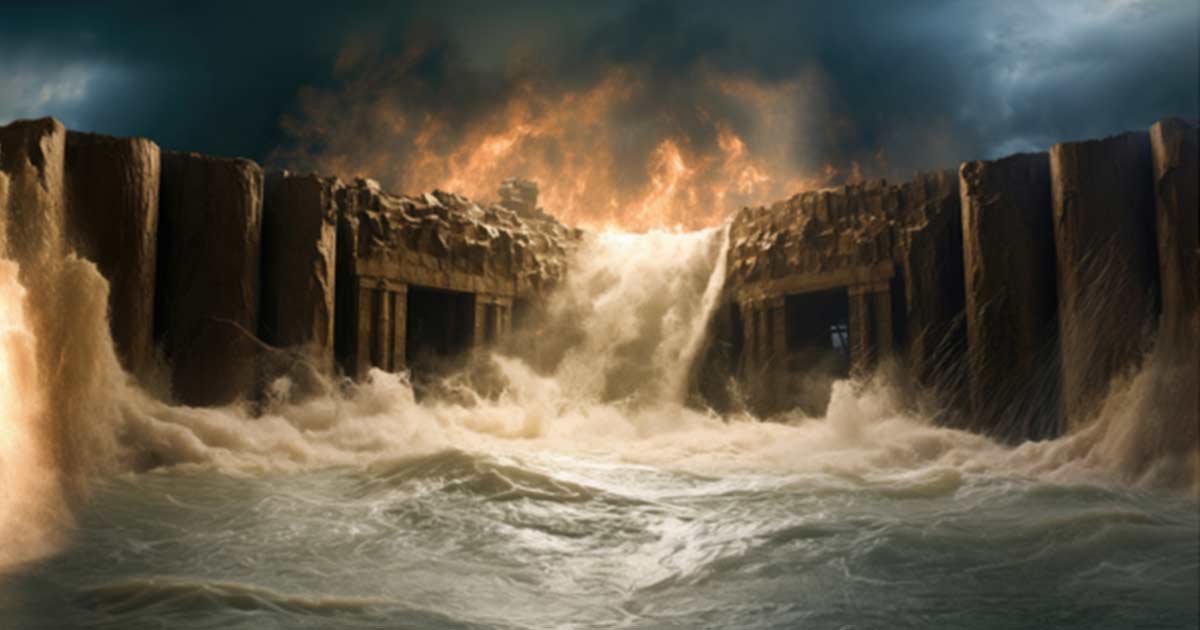How Sumerian Tablets Told the Story of The Great Flood
The world's first known flood myth can be traced back to the Sumerians around 2000 BC. Sumerian tablets recount captivating tales of human beginnings, the creation of mankind, and the profound interventions of the gods.
The most famous myth depicted in Sumerian clay tablets is the story of a monumental deluge, a central theme in ancient narratives. Driven by divine discontent with humanity, the highest deity's decision and the clandestine guidance of another god lead to the epic tale of a colossal flood.
- Does ‘New Evidence’ Prove Noah’s Ark Is Buried on a Turkish Mountain?
- Prophecy Through the Ages: Society, Power and Legend
Divine Discontent and Human Uproar
Read the text below with the origins of the word ‘myth’ in mind, as well as the great civilization that the Sumerians built.
“Twelve hundred years had not yet passed when the land extended and the peoples multiplied. The land was bellowing like a bull.
The God got disturbed with their uproar. Enlil heard their noise.
And addressed the great Gods, ‘The noise of mankind has become too intense for me, with their uproar I am deprived of sleep. Cut off supplies for the peoples, Let there be a scarcity of planet-life to satisfy their hunger.
Adad [another Custodian] should withhold his rain, and below, the flood [the regular flooding of the land which made it fertile] should not come up from the abyss.
Let the wind blow and parch the ground, let the clouds thicken but not release a downpour, let the fields diminish their yields.
There must be no rejoicing among them.”
From the book of William Bramley, The Gods of Eden.”
In these mythological references, it shows that gods were angry with the noise that humans were making and decided to destroy humanity. Of course ‘noise’ can be interpreted as anything that was against the will of the ‘gods’, or defying their power, as mentioned in Genesis and other mythologies, such as the Cataclysm of Ra .

The Deluge (1840) by Francis Danby, in the Tate Gallery. (Public Domain)
Also, we again see a blood thirsty and ruthless behavior of the gods, another common element among these myths. In another cuneiform Assyrian tablet then we see:
“Command that there be a plague,
Let Namtar diminish their noise.
Let disease, sickness, plague and pestilence
Blow upon them like a tornado.
They commanded and there was plague
Namtar diminished their noise.
Disease, sickness, plague and pestilence
Blew upon them like a tornado. From the book of William Bramley, The Gods of Eden.”
In the Sumerian tablets it mentions that just before the flood, ‘gods’ left Earth to be safe in the heavens and returned after the end of the flood.

Sumerian god Enki, sea god who warned Atra-hasis. (Public Domain) Right: One of the Sumerian tablets with the Atra-Hasis Epic at the British Museum. (Public Domain)
Exploring the Flood Narratives in the Bible and Sumerian Mythology
The story of Noah depicts a similar story as that in the Epic of Gilgamesh, which predates The Bible. According to that epic, the god Enki (or Ea) was the creator of man, of whom he was fond. Enki approached a man named Utnapishtim (or Atra-hasis in the table called Eridu Genesis, or Ziusudra) and revealed the plans of the gods, giving him the exact plans of how to build a boat and going against the will of the other gods. Once the flood was over, Utnapishtim sends three different birds (a dove, a swallow and a raven) to find land. Once on land, Utnapishtim offered sacrifices to the gods. A few gods found Utnapishtim and the other survivors, and because of mercy they did not kill them but transferred them to another area to live.
Obviously in the Babylonian myths, gods create the flood and gods save the one faithful and obedient survivor; but again, more survive the flood.

Within the Sumerian flood narrative, the deities release the Deluge, an immense tempest that inundates the entire world. (Public Domain)
Drawing Parallels to Modern Concerns in the Face of Climate Change
Is it possible for the flood to be something that indeed happened? The answer is yes. About 10,000 BC, a shift happened in the axis of the Earth because of the increased ice on the poles, which resulted in melting ice raising the levels of the oceans and flooding across the world. However, such a flood wouldn’t eliminate humanity on Earth, and a great number of people would have survived.
Geologists William Ryan and Walter Pitman of the Columbia University suggested that a great flood in the Middle East resulted from rising water levels at the end of the last Ice Age around 7,000 years ago.
If we take into account the Sumerian tables, the flood mentioned would have occurred around 3000 BC, which doesn’t coincide with the last polar shift. Or did other floods arise since the last polar shift, as the Egyptian priest said to Plato when he suggested that many floods happened before the end of Atlantis and the Deucalion Greek flood myth? If yes, some say those flood gods would have been responsible for scaling back the flood waters and restricting them to specific areas.
- Hollywood resurrects Noah's Ark, but did they get it right?
- Dead Seas Scrolls Reveal that Noah's Ark Was Shaped Like a Pyramid
Echoes Across Eras
In tracing the origins of world mythology's earliest flood legend back to the Sumerians around 2000 BC, we unveil a treasure trove of stories that delve into human origins, divine intervention, and epic cataclysms. Foremost among these narratives is the renowned tale of the monumental deluge, an ancient theme rooted in the discontent of deities with human clamor. This myth, engraved upon Sumerian clay tablets, resonates through time, bridging the gap between antiquity and the modern world. The echoes of the myth's core elements – divine anger, the struggle for survival, and the reshaping of the world – resonate in today's context as we confront the imminent threat of climate change. Looking back, the Sumerian tablets offer insight into humanity's enduring quest to comprehend its origins and its relationship with the forces beyond.
Top image: The Great Flood. Source: Faith Stock/Adobe Stock


















Comments
I enjoyed the article thanks. One slight inaccuracy, the Egyptian priest did not tell Plato directly about Atlantis but rather Solon, which the (also very good) article you linked to confirms.